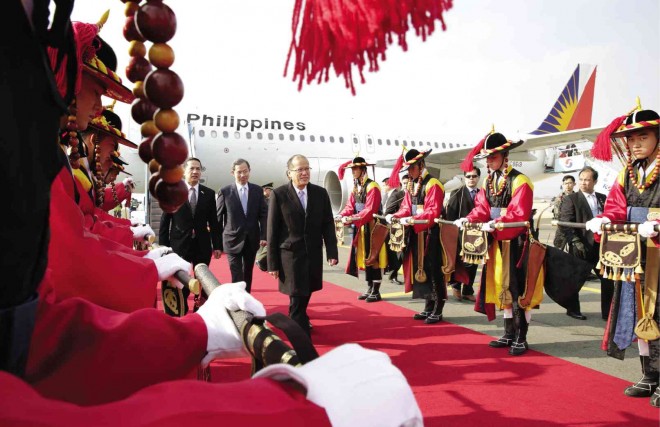Aquino says thank you to Korea for ‘Yolanda’ aid

RED CARPET President Aquino gets a red carpet welcome at the VIP Terminal of the Gimhae Air Base in Busan, South Korea, where he is joining other leaders of the Association of Southeast Asian Nations for the 25th Asean-Republic of Korea Commemorative Summit 2014. He is accompanied by Philippine Ambassador to South Korea Raul Hernandez. MALACANANG PHOTO BUREAU
BUSAN, South Korea—The 500-strong South Korean military force, called Araw Troops, brought sunshine to the Visayas in the aftermath of Supertyphoon “Yolanda” and President Aquino did not forget this.
During a meeting on Thursday with South Korean President Park Geun-hye, Aquino recognized the efforts of soldiers who helped rebuild schools, hospitals and damaged infrastructure in provinces ravaged one year ago by Yolanda, internationally called Haiyan.
Aquino thanked South Korea for its extensive humanitarian, rehabilitation and recovery assistance to the Philippines in the aftermath of the strongest typhoon to make landfall on Nov. 8, 2013, that killed more than 6,300 Filipinos.
The soldiers flew to the country in the wake of Yolanda and named their contingent after the Filipino term for sun to give hope to the survivors. They said they came to show their gratitude for the country’s support during the Korean War in the 1950s.
The Araw Troops went to work in Leyte province and took part in the repair and reconstruction of government facilities, conducted medical operations and donated engineering equipment and supplies, said presidential spokesman Herminio Coloma Jr., who briefed reporters on the meeting between the two leaders.
Article continues after this advertisementAquino also noted that the South Korean force was still in Leyte and was among those who experienced Typhoon “Ruby” (international name: Hagupit), which hit the country over the weekend. He said the troops had good rapport with municipal authorities and there were requests to extend their stay there.
Article continues after this advertisementIn his meeting with the South Korean president hours after his arrival in Busan to attend the two-day Asean-Republic of Korea Commemorative Summit,
Aquino discussed the situation in the South China Sea and the Korean Peninsula, according to Coloma.
Aquino said the two countries have a “shared stake in maintaining unimpeded commerce and freedom of navigation in the region,” Coloma said.
Park thanked President Aquino for attending the summit despite the weekend typhoon. She said the Seoul government would coordinate with the Philippines to support the recovery work in areas affected by Ruby.
Defense cooperation
Aquino sought South Korea’s continued support in the peaceful resolution of disputes in the South China Sea, Coloma said.
Aquino reiterated the Philippines’ support for the moves to bring about the peaceful denuclearization of the Korean Peninsula and the early resumption of the six-party talks aimed at resolving the dispute over North Korea’s nuclear program.
Park, for her part, affirmed Seoul’s defense cooperation agreement with the Philippines, recalling Manila’s decision to acquire 12 FA-50 fighter aircraft and transport equipment, Coloma said. The Philippines is set to receive donations from South Korea consisting of a patrol combat corvette, a landing craft utility and 16 rubber boats, he added.
President Aquino is also scheduled to meet Friday with the South Korean air force officers and top officials of Korea Aerospace Industries Ltd., the supplier of the fighter jets that the Philippines is buying for P18.9 billion.
Aquino will view a model of the fighter jet and will be briefed about its features. Delivery of the aircraft is expected in 2015.
The President told Park that the Philippines intended to pursue a comprehensive strategic partnership with South Korea, noting the two countries’ similarities, according to Coloma.
Aquino said both countries were “sister democracies” and face the same threats and challenges. They also both value freedom, respect for human rights, and adherence to the rule of law, Coloma said.
Aquino expressed his condolences for the sinking of the Korean fishing vessel Oryong 501 in the Bering Sea. Seven of 13 Filipino crew members of the vessel remain missing. Three were rescued and three died.
Police desks
The President also told Park he would order the setting up of dedicated South Korean desks in police offices in the Philippines as part of measures to address crimes involving its nationals in the country, as a rising number of South Koreans make the Philippines their new home or holiday destination.
From January to August this year, nine Koreans have died in violent incidents in the Philippines. Among those killed were a 21-year-old student who was abducted and murdered in March and a businessman who was slain in a carjacking incident.
The President also said the government would initiate more dialogues with the Korean community in the Philippines, Coloma added.
There are some 90,000 Koreans, including retirees, in the country. Many of those who have settled in the country had been drawn to the low cost of English language education and housing.
South Korea has also been the Philippines’ top source of tourist arrivals since 2010, numbering 1.165 million in 2013. They constitute nearly a quarter of annual tourist arrivals in the country.
RELATED STORIES
Ramos urges Aquino to learn from Korea
Aquino changes mind, pushes through with 2-day trip to Korea
Korea leader welcomes Aquino, extends condolences over Bohol quake